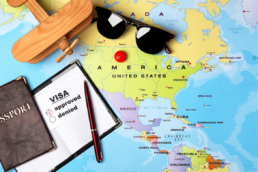Our lives are extensively documented on phones, laptops and in the cloud. These devices carry records of private conversations, photos, medical documents, banking information, travel history, internet browsing history and much more. Some of this information is very personal and it can be sensitive to many travelers entering the United States. With the number of electronic device searches growing, knowing your rights and how to effectively protect your data at the border has never been more important.
Knowing Your Rights: Routine v. Non-Routine Border Searches
In general, government agents at the U.S. border enjoy far more power compared to law enforcement officers working in the American interior. Default constitutional privacy rights are relaxed, and customs officers take a broad view of what they are permitted to do, but the border is not a constitution-free zone. A distinction is drawn between “routine” and “non-routine” border searches. The standard warrant and probable cause requirements do not apply in the case of a routine search. This means a CBP officer and/or ICE agents may perform a quick, cursory search of your electronic devices at primary or secondary inspection without a warrant and without any reason to believe your device contains contraband. A non-routine search, however, such as the forensic search discussed in U.S. v. Cotterman (2013), requires at least a reasonable suspicion of illegal activity. There, the Court of Appeals for the Ninth Circuit held that conducting a forensic search, aided by sophisticated software, of the defendant’s laptop was non-routine.
Tips for Protecting your Data
The distinction between “routine” and “non-routine” border searches is a little murky. There definitely are instances when CBP does not have the authority to search a passenger’s electronic device, but that scenario is rare. Under the current interpretation of the law, most electronic device searches at the border are routine. However, there are ways to protect your data:
- Store sensitive information with online cloud services. Cloud storage is useful as a means to back up your data and to prevent against data loss in case your device is seized, lost or stolen. It is also a useful strategy for shifting data online so that it is not present on your electronic devices when you cross the border. CBP does not have the authority to search any information you have stored on a cloud service without first obtaining a subpoena or warrant.
- Use a travel computer/cell phone. If you have personal or sensitive information on your cell phone or laptop, using a travel phone or computer will help you manage the information that accompanies you across the border.
Things to Keep in Mind
- If you are a U.S. citizen, CBP cannot stop you from entering the country even if you refuse to unlock your device, provide passwords or disclose social media information. However, refusing to comply with CBP requests will likely escalate the situation. Your device may be seized and the length of your detention may be increased significantly. If you are a legal permanent resident, agents may raise complicated questions about your continued status as a green card holder, and if you are a foreign visitor, refusing to comply with CBP can result in you being denied entry to the U.S.
- Do not lie. If you find yourself in an uncomfortable situation and a border agent is asking you questions or requesting information about your electronic device data, do not lie. It is a crime to make a false statement to a law enforcement official who is asking you questions as part of their job, and misrepresenting information related to your admission to the U.S. can result in a permanent bar.
If you are interested in visiting, living or working in the U.S., please contact our office to schedule a consultation with one of our attorneys today!
Ready to have Berardi on your side?
Whether you’re a business looking to hire or a professional hoping to relocate, immigration law can be complicated. But you don’t have to do it alone. Put our experience to work for you.



